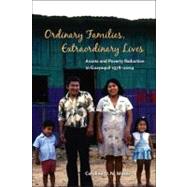Ordinary Families, Extraordinary Lives Assets and Poverty Reduction in Guayaquil, 1978-2004
, by Moser, Caroline O.N.- ISBN: 9780815703273 | 0815703279
- Cover: Paperback
- Copyright: 11/3/2009
Fifty years after Oscar Lewis's famous depiction of five Mexican families caught in a "culture of poverty," Caroline Moser tells a very different story of five neighborhood women and their families strategically accumulating assets to escape poverty in the Ecuadoran city of Guayaquil. In Ordinary Families, Extraordinary Lives, Moser shows how amore sophisticated understanding of the complexities of asset accumulation aswell as poverty itself can help counter inaccurate stereotypes about global poverty. It provides invaluable insight into strategies that may help people in developing countries improve their wellbeing. The similar socioeconomic characteristics and economic circumstances of the Guayaquil families in 1978, when Moser began her research, set the stage for a natural experiment. By 2004, these circumstances varied widely. Moser captures the causes and consequences of these developments through economic data, anthropological narrative, and personal photos. She then places this compelling story within the broader context of political, economic, and spatial changes in Guayaquil and Ecuador. Moser describes how households in a Third World urban slum relentlessly and systematically fought to accumulate human, social, and financial capital assets. Her longitudinal account of their odyssey captures long-term trends and changes in perception that are missed in snapshot assessments. Chapters in this holistic story cover diverse issues such as housing and infrastructure, community mobilization and political negotiation, employment, family dynamics, violence, and emigration.






